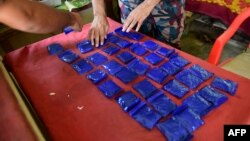Bangladesh's cabinet on Monday approved a draft law prescribing the death penalty for drug offenses, despite widespread criticism over a narcotics crackdown in which police have shot dead more than 200 people since May.
Prime Minister Sheikh Hasina has launched a campaign to toughen punishments for drug crimes ahead of a general election due by December. But the police killings have prompted fears among rights groups of a bloody Philippines-style campaign to wipe out drugs offenders.
The proposed amendment to the 1990 Narcotics Control Act for the first time defines methamphetamine pills, also known as 'yaba', as narcotics, Cabinet Secretary Mohammad Shafiul Alam told reporters after a meeting chaired by Hasina.
The current maximum punishment for possession of yaba is a prison term of 15 years.
The draft law "proposes the death sentence as maximum punishment for producing, smuggling, distributing and using more than 5 grams of 'yaba'," Alam said, adding possession of less than 5 grams (0.18 oz) would attract a maximum jail term of five years.
The amendment also targets the smoking of cannabis in shisha water pipes.
Tougher punishment was needed to curb the spread of yaba, a highly potent stimulant smuggled in from neighbouring Myanmar, Alam said, adding that the bill had been prepared in line with other international legislation on drugs.
Bangladesh has said an influx last year of Rohingya fleeing Buddhist-majority Myanmar is partly to blame for soaring methamphetamine use.
But many Rohingya say their young people are being pushed into crime because they cannot legally work or, in many cases, even receive aid.
Hasina has vowed to continue the campaign until Bangladesh is freed of the drug menace, but critics say it as a sign of her increasingly authoritarian rule ahead of the election.
In more than a third of the killings recorded by Dhaka-based human rights group Odhikar since mid-May, the suspects were arrested before they were killed.
The government has dismissed accusations of extrajudicial killings, saying the crackdown has popular support.
